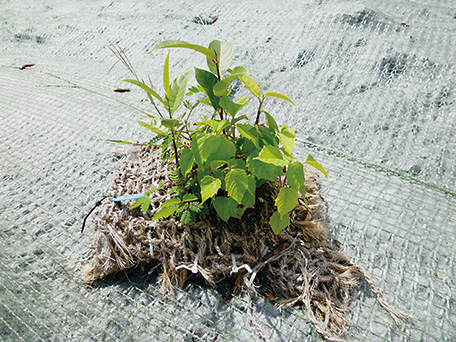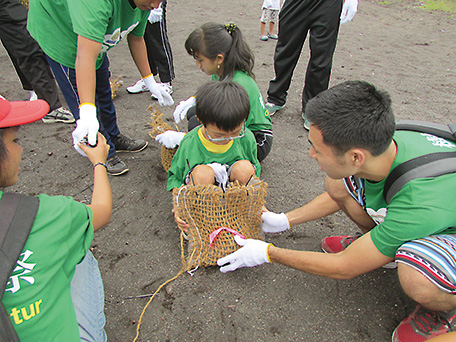Master Techniques, From Japan to the World - 07
Bringing vegetation back to the denuded land around a volcano
– An industry-academia collaboration tends the soil in Indonesia in order
to green and revitalize the land

A seed bag placed on “Takino” Filter (multifunctional filter). (Photo: Takino Filter Inc.)
Indonesia is a country of volcanos. There are as many as 130 active volcanos there, with 17 currently very active. Large eruptions at Mt. Batur in 1917 and 1926 scattered debris across a wide area around the mountain in the northeastern part of Bali, and this debris continues to devastate the land. In places where the roots of trees and plants are no longer able to take hold, the soil becomes loose. This could lead to landslides and other disasters. Denudation could also cause depletion of groundwater arteries that serve as the water source for urban areas in Bali, a popular tourist destination. Urgent countermeasures are needed.
Udayana University in southern Bali tried to grow a variety of plants in order to bring greenery back to the denuded land, but their trial did not turn out successful. The university has an exchange agreement with Yamaguchi University, which came to know of this issue through joint research on disaster management. Hearing about the problem, Yamaguchi University proposed to Udayana University that they restore the local ecosystem by making use of the “Takino” Filter (“Takino” means “multifunctional” in Japanese), a specialized fiber sheet to promote plant growth developed by an industry-academia collaboration1 between Yamaguchi University and Takino Filter Inc. based in Yamaguchi Prefecture.
Mr. Kazuo Yamamoto, president of Takino Filter Inc. explained the unique functions of the filter: “The Takino Filter, developed in 1994, is constructed using ultrafine polyester fibers, which are overlapped by reinforced nets. The device catches seeds flying around in the vicinity to settle in the soil. By laying this sheet over the ground, moisture is kept in the soil, and it allows the soil to be maintained in a natural manner. As the sheet directly covers the top soil, we can also prevent soil erosion caused by rain and guard against landslides. This product has been used in all 47 prefectures across Japan to restore greenery and revitalize soil.”
As part of a pilot project in 2011, Takino Filter sheets were laid out over 100m2 of denuded land at Mt. Batur. In addition, 50 of the company's special seed bags containing plant seeds, microorganisms, and other compounds were also placed. As the effectiveness of the Filter and the seed bags was confirmed, the efforts continued as a Project Formulation Survey2 adopted by Ministry of Foreign Affairs of Japan in 2012. Then, additional sheets and 100 seed bags were spread out over an area of approximately 2,500m2. The plants grew well, enhancing the green revitalization of the area. However, further continuous on-site efforts were needed in order to prevent this work from ending with only temporary effects.
That is why Mr. Yamamoto and his colleagues decided to develop products that can be locally produced using local materials. At the same time, they engaged local residents and high school students to raise awareness about environmental protection and disaster management. To that end, from September 2013 Takino Filter Inc. made use of JICA's scheme: Pilot Survey of Disseminating Small and Medium Enterprises Technology3 to start activities to verify the efficiency and effectiveness of the Takino Filter sheets in Indonesia. Under this scheme, Udayana and Yamaguchi Universities have jointly developed a Takino Filter made of local materials, as well as seed bags containing local microbes. The products are manufactured in a research laboratory in Udayana University, and examinations are currently underway to verify their effectiveness in the area around Mt. Batur.

A tree planting event was held at the local site in December 2013. (Photo: Takino Filter Inc.)
Mr. Yamamoto spoke optimistically about the development of the local project: “We are now working to grow trees in the desolate area around Mt. Batur. A tree planting ceremony was held as a part of our environmental education activities, attracting some 320 local high school students and resident volunteers. They placed seed bags that contained the seeds of local plants such as the white leadtree (a deciduous shrub in the Leguminosae family) and teak (a deciduous tall tree in the Labiatae family). Local residents praised the event highly, saying it was much easier than planting saplings, which is what they normally do. I hope that activities like these will give the local people a mindset for environmental conservation and disaster management.”
In Indonesia, there are still many tasks ahead in the fields of disaster management and environmental protection, as it is a country that often faces natural disasters. Japan can be of great help to Indonesia. As a country prone to natural disasters like Indonesia, Japan accumulated a great amount of technology and knowledge through its own experiences that Indonesia can make use of.
“With this Pilot Survey, we made a start on the revitalization of denuded land. Moving forward, I think we are going to need to examine whether or not we can also use this technology along roads and the shoreline. We will consider the possibility of expanding this soil improvement work across Indonesia as we work to confirm the result of the pilot project. Since we are using local materials, this work can contribute to the Indonesian economy and also create new local employment opportunities. I also have great expectations for personnel exchanges through joint research and technology development with Udayana University and Yamaguchi University,” said Mr. Yamamoto. From small seeds grow saplings, which in turn create greenery. With its robust roots now set in the local soil, it seems that this industry-academia collaboration project will grow even larger.
*1 Projects in which private companies and educational/research institutions such as universities conduct joint research or product development.
*2 Surveys that consider ways to use products and technologies developed by Japan's Small and Medium Enterprises (SMEs) and other companies for the development of developing countries.
*3 Projects that consider ways to promote products and technologies developed by Japan's SMEs and other companies in developing countries through pilot and demonstration activities aimed at making the products and technologies more compatible with local conditions, based on proposals from such companies and other organizations. Projects are funded with up to a total of ¥100 million for a cooperation period of approximately one to three years.
<< Previous Page
Main Text | Statictics and Reference Materials | Stories from the field | Master Techniques, From Japan to the World - | ODA Topics
